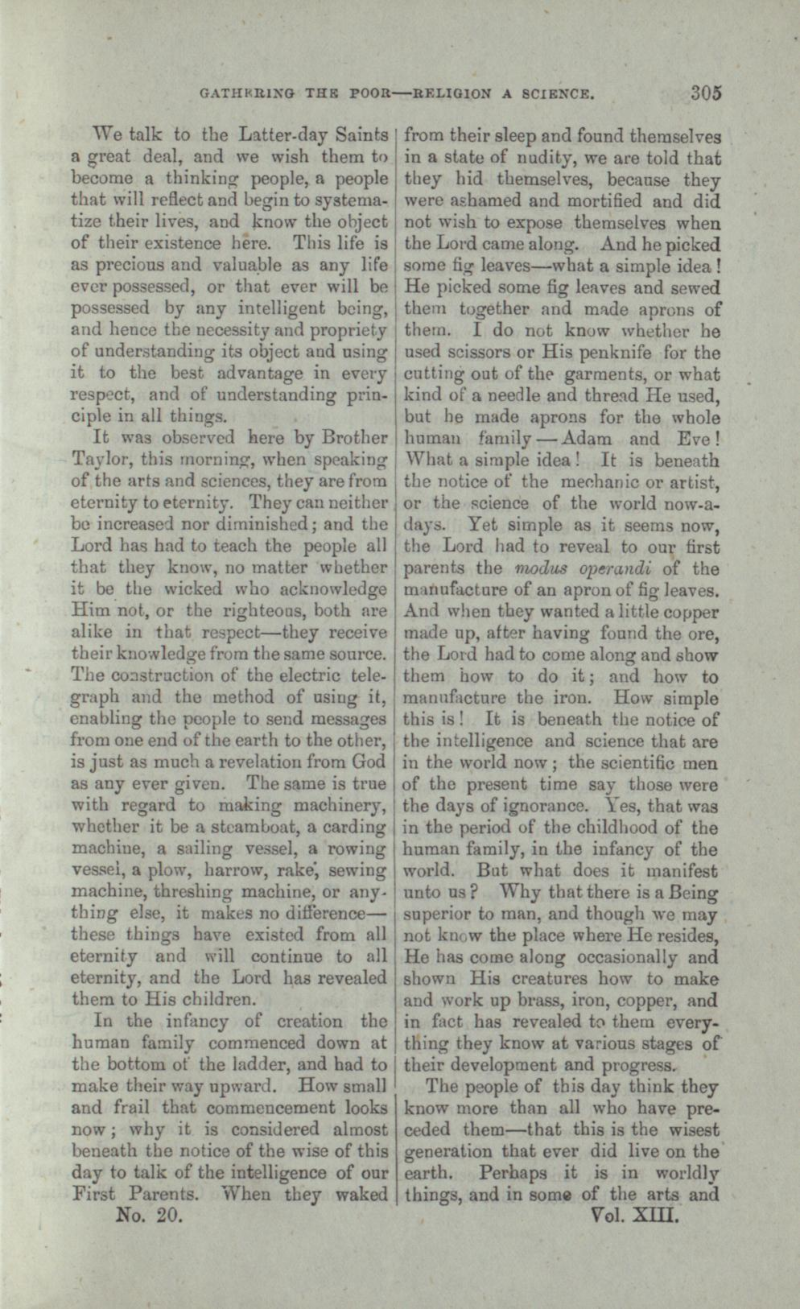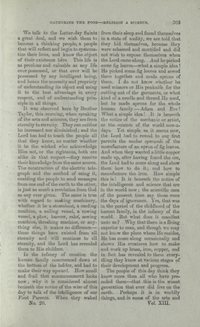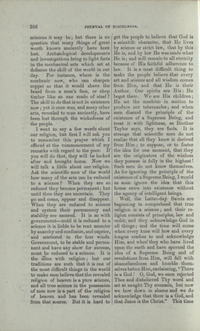Brigham Young, when discussing the fig aprons, makes a distinction between Adam and Eve and the God who placed them in the Garden of Eden.
- Type
- Speech / Court Transcript
- Hearsay
- Scribed Verbatim
- Reference
Brigham Young, "Gathering the Poor—Religion a Science," Journal of Discourses, 26 vols. (Liverpool: Horace S. Eldredge, 1871), 13:305-306
- Scribe/Publisher
- David W. Evans
- Audience
- Latter-day Saints, Reading Public
- Transcription
In the infancy of creation the human family commenced down at the bottom of the ladder, and had to make their way upward. How small and frail that commencement looks now; why it is considered almost beneath the notice of the wise of this day to talk of the intelligence of our First Parents. When they waked from their sleep and found themselves in a state of nudity, we are told that they hid themselves, because they were ashamed and mortified and did not wish to expose themselves when the Lord came along. And he picked some fig leaves—what a simple idea! He picked some fig leaves and sewed them together and made aprons of them. I do not know whether he used scissors or His penknife for the cutting out of the garments, or what kind of a needle and thread He used, but he made aprons for the whole human family—Adam and Eve! What a simple idea! It is beneath the notice, of the mechanic or artist, or the science of the world now-a-days. Yet simple as it seems now, the Lord had to reveal to our first parents the modus operandi of the manufacture of an apron of fig leaves. And when they wanted a little copper made up, after having found the ore, the Lord had to come along and show them how to do it; and how to manufacture the iron. How simple this is! It is beneath the notice of the intelligence and science that are in the world now; the scientific men of the present time say those were the days of ignorance. Yes, that was in the period of the childhood of the human family; in the infancy of the world. But what does it manifest unto us? Why that there is a Being superior to man, and though we may not know the place where He resides, He has come along occasionally and shown His creatures how to make and work up brass, iron, copper, and in fact has revealed to them everything they know at various stages of their development and progress.
The people of this day think they know more than all who have preceded them—that this is the wisest generation that ever did live on the earth. Perhaps it is in worldly things, and in some of the arts and sciences it may be; but there is no question that many things of great worth known anciently have been lost. Archaeological developments and investigations bring to light facts in the mechanical arts which set at defiance the skill of the world in our day. For instance, where is the mechanic now, who can sharpen copper so that it would shave the beard from a man's face, or chop timber like an axe made of steel? The skill to do that is not in existence now; yet it once was, and many other arts, revealed to man anciently, have been lost through the wickedness of the people.
I want to say a few words about our religion, but first I will ask you to remember this prayer which I offered at the commencement of my remarks with regard to the poor. If you will do that, they will be looked after and brought home. Now we will talk a little about our religion. Ask the scientific men of the world how many of the arts can be reduced to a science? When they are so reduced they become permanent; but until then they are uncertain. They go and come, appear and disappear. When they are reduced to science and system their permanency and stability are assured. It is so with government—until it is reduced to a science it is liable to be rent asunder by anarchy and confusion, and caprice, and scattered to the four winds. Government, to be stable and permanent and have any show for success, must be reduced to a science. It is the same with religion; but our traditions are such that it is one of the most difficult things in the world to make men believe that the revealed religion of heaven is a pure science, and all true science in the possession of men now is a part of the religion of heaven and has been revealed from that source. But it is hard to get the people to believe that God is a scientific character, that He lives by science or strict law, that by this He is, and by law He was made what He is; and will remain to all eternity because of His faithful adherence to law. It is a most difficult thing to make the people believe that every art and science and all wisdom comes from Him, and that He is their Author. Our spirits are His: He begot them. We are His children; He set the machine in motion to produce our tabernacles; and when men discard the principle of the existence of a Supreme Being, and treat it with lightness, as Brother Taylor says, they are fools. It is strange that scientific men do not realize that all they know is derived from Him; to suppose, or to foster the idea for one moment, that they are the originators of the wisdom they possess is folly in the highest! Such men do not know themselves. As for ignoring the principle of the existence of a Supreme Being, I would as soon ignore the idea that this house came into existence without the agency of intelligent beings.
Well, the Latter-day Saints are beginning to comprehend that true religion is a science; and their religion consists of principles, law and order, and they acknowledge God in all things; and the time will come when every knee will bow and every tongue confess to and acknowledge litre, and when they who have lived upon the earth and have spurned the idea of a Supreme Being and of revelations from Him, will fall with shamefacedness and humble themselves before Him, exclaiming, "There is a God! O, God, we once rejected Thee and disbelieved Thy word and set at naught Thy counsels, but now we bow down in shame and we do acknowledge that there is a God, and that Jesus is the Christ."
- Citations in Mormonr Qnas
The B. H. Roberts Foundation is not owned by, operated by, or affiliated with the Church of Jesus Christ of Latter-day Saints.



